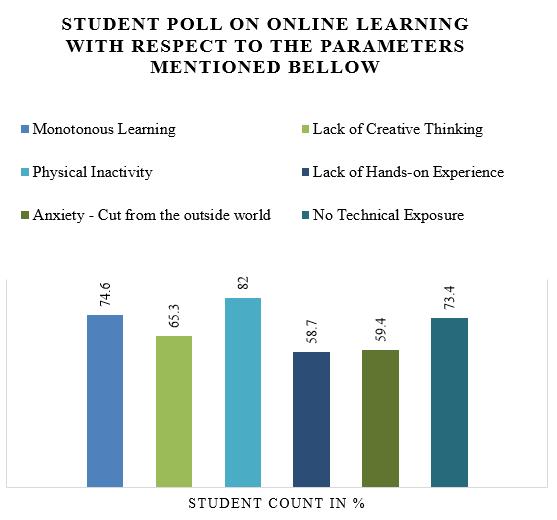
2 minute read
Page
VOLUME: 08 ISSUE: 01 | JAN 2021 WWW.IRJET.NET P-ISSN: 2395-0072
group presentations were scheduled on MS TEAMS. It improved their emotional quotient & keptthemwelloccupied.
Advertisement
iii. Need for Creative thinking: The increase in screen time was well balanced by our VAC (value added courses):
Studentsweretrainedfordifferentintensivevalue added programs such as Household wiring, Household equipment & appliances, mobile repairing,circuitdesigning.Itgavethemhands-on attheirresidentialpremisesitself&providedfood for thought to improve any circuit in their residenceitself.
iv. Physical Inactivity: Thesedentarylifestyleforced on the common people disturbed the mental wellbeingalarmingthehealthofalltheindividuals acrosstheglobe:
Yoga & fitness sessions along with healthy eating habits sessions were virtually conducted on a weeklybasistokeepourstudentshale&hearty.
v. Lack of technical exposure & Lack of hands-on:
The trend of conducting practical along with theory was kept alive with our own online lab methodology developed in-house by our technical team.
Also practical were regularly conducted by simulations,onlinekits,freesoftwareavailablefor the practical of the given curriculum, & demonstrations via video recordings at our lab premise.
vi. Decline in reading habit: The most alarming thing; found out was decline in reading habit due toincreaseinscreentime.
Hence a book reading & book review competition was organizedforthestudents.Thestudentsweresupposedto readbooksavailableattheirhomepremises&givereview on the same. The category of books could be of any type including philosophy, spiritual, technical, fiction & written in any language. It gave an insight of a range of books; to thestudentstoread.
CONCLUSION
The current generation faculties need to learn the challengesofonlinelearning&onlythentheycanprepare themselves properly for teaching the generation next students. Teachers need to evaluate the student behavior and the class strength by a small survey to introduce dynamic learning and students need to understand online learning and how to behave in online settings to obtain maximum active learning strategies in their learning Understanding student characteristics is important to preparestudentsfortheteachersinonlinelearning.
Learnerautonomyaswellascollaborativestrategiesneeds to be negotiated for the effectiveness of learning. Group processesandhowcollaborationcanbefacilitatedneedto be taught to students during their education. Instructors needtoknowthegroupprocessesanddynamicsaswellas strategies of how to engage students in effective communication and learning. Recognition of a student’s capabilities and limitations, an understanding of student expectations and motivations, and the personas they may take during online learning can help encourage active learning.
ACKNOWLEDGMENT
We sincerely thank the management of Vidyalankar Dyanpeeth Trust and Vidyalankar Polytechnic for providinguswithallthenecessaryinformationforwriting thispaper.WearehighlygratefultoourManagingDirector Shri Vishwas Deshpande for his indomitable support and guidance. He has been a remarkable source of inspiration and motivation in sustaining the quality and integrity of the institute. We also thank Principal Ashish Ukidve & HOD, EXTC department Mr. Anjum Mujawar for their unconditionalsupportinalltheactivitiesweundertake.
REFERENCES
1) The challenges of E-learning system: Higher educational tutions Perspective Leila Shahmoradi,
Vahid Changizi1 , Esmaeil Mehraeen, Azadeh Bashiri,
BehroozJannat2 ,MahsaHossein 2) The challenges of E ‑ learning system: Higher educational institutions perspectiveLeila Shahmoradi,
Vahid Changizi1, Esmaeil Mehraeen, Azadeh Bashiri,
BehroozJannat2,MahsaHossein. 3) Applicability and Necessity of E-Learning Courses
BasedonParticipants’ViewpointsinaSummerSchool,
“ZahraKarimian”. 4) OnlineEducationandItsEffectivePractice:
AResearchReview
AnnaSunandXiufangChen
RowanUniversity,Glassboro,NJ,USA 5) OnlineEducationandItsEffectivePractice:AResearch
ReviewAnnaSunandXiufangChenRowanUniversity,
Glassboro,NJ,USA 6) The impact of online learning during COVID-19: students and teachers’ perspective. “Deepika
Nambiar”. 7) Covid-19pandemicandonlinelearning:thechallenges and opportunities, Olasile Babatunde Adedoyin &EmrahSoykan. 8) Challenges of Interaction in Online Teaching: A Case
Study; Tom Drange, Iain Sutherland & Alastair
IronsNoroffUniversityCollege,Norway



